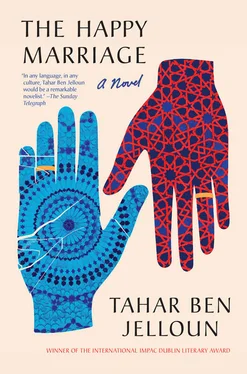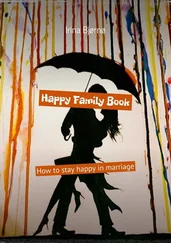I remember the night I didn’t come home — which Foulane mentioned in his manuscript — as clearly as he does. Some girlfriends I’d met up with that afternoon told me that I looked awful and unhappy. So they decided to take me out that night. We had dinner at a good restaurant and we wound up at a fashionable nightclub. I danced like a madwomen, flirted with some blond guy, and later that morning I picked up some croissants and went home. Foulane was there waiting for me, car keys in hand, and he asked me where I’d been. So I told him: “At a nightclub!” He slammed the door behind him, rushed down the stairs, and left. It wasn’t until later that I learned that he’d showed up at my parents’ house to complain like people do in conservative families. Where the daughter, despite being married, is always seen as a little girl, and her parents, who always side with the husband, even have the right to punish her, beat her up and lock her away. But my parents didn’t trust him as much as they trusted me. They didn’t believe him, muttered a few stock sentences, and then discreetly called me to inform me of his sudden visit. They didn’t like him. They found him arrogant and spiteful. They knew that he didn’t make me happy, but we don’t divorce in our culture, it’s part of our tradition. Instead, my mother recommended I go see Hajja Saadia, who was capable of casting good and evil spells alike. I refused. Not that. Not yet. How many times had I slipped a potion into his coffee to make him devoid of willpower? A potion that apparently consisted of powdered hyena brains along with other African and even Brazilian ingredients …
I shouldn’t have gone back to the house that day, it’s true, but our son was six months old and I couldn’t just leave him. After that episode, I felt like leaving him often, but whenever the thought occurred to me, I would quickly change my mind and tell myself: “He’s going to change, he’s an old bachelor who doesn’t know how to share his life with someone and be responsible, but he’ll wake up eventually and assume his responsibilities, he’s going to understand that this isn’t just about him, that he’s got a family and has to act like it.” So I would give him some time and the chance to give up his old solitary habits.
Not long afterward, he was awarded a prestigious international prize for his painting, which was followed by a number of trips and exhibitions. He took me everywhere with him: Egypt, Brazil, Italy, the U.S., Mexico, Russia, and so forth. I loved those trips, the fancy hotels, the great food, and the chance to discover the beautiful cloths and jewelry of the Far East. Whenever we traveled, we got along a lot better, even from a sexual point of view. But when we came back home, he would go into a sulk and lock himself up in his studio, where he found it difficult to get any work done because all the traveling had interfered with his painting.
By this time the 1980s had drawn to a close and he began to be hospitalized for various ailments, which would gradually lead to his stroke. I would worry about him because he looked so agitated, pale and stressed. I wasn’t sweet toward him, because I thought that it would be better for me to remain strong and deal with the pain, especially because his prognoses weren’t that alarming. He spent whole nights without sleeping, preventing me from getting any, blaming me for the parasite he’d contracted in China, a country he’d wanted to visit without me. It served him right! While he was in the hospital, I prepared his food, took care of his correspondence and canceled all his engagements. His American agent came to see him: not because he was worried about his client; quite the contrary, he came to weigh up the situation! If Foulane suddenly died, the price of his paintings would go through the roof. Armed with a box of chocolates he bought at the airport, he went to the sick man’s bedside. Once he’d inquired after his health, he jumped back on the plane and went back to calmly inform the gallerists he worked with.
Foulane was overjoyed that his agent had come all the way from New York just to see him. When I expressed some doubts as to the real reasons behind his visit, Foulane flew into a fury, despite the fact he was wearing an oxygen mask. Three days after he was discharged from the hospital, Foulane lost one of his closest friends — who’d been among those who’d accompanied him when he asked my parents for my hand in marriage — to a rare disease. This loss affected him deeply, especially since he’d just had a close brush with death. Foulane was surprised to see I didn’t share his grief. But I’m not the sort of woman who laid it on thick, or said or did sweet things. That’s just the way I am. My father didn’t kiss me after the age of three or four. Throughout those months, I had to put up with a hypochondriac who roamed around the house like an old man, never going out in the evenings, and who spent all his time drawing in his sketchbooks. He stopped painting. His gallerist called him and sent him an advance for his next exhibition. Since he loved money, he got back to work. No more illnesses, no more laziness. He would get up very early in the morning and go to his studio, and in the evenings he would tell me what he’d done that day. Now I’m going to have to see even more money slip through our fingers, I told myself. I knew he wanted to help a relative of his whose business had gone under. So I called his American gallerist and asked him to wire the royalty payments directly to me. His reply was curt: “We’ve had express orders from Foulane not to do so as long as he’s alive.”
I was dumbfounded. I mumbled an apology and started to cry.
My mistake was to think people can change. None of us change, not least of which a man who’s already lived out most of his life. I entered his life at a time when he’d decided to stop having fun and settle down, because the anxiety of his encroaching death had begun to creep over him. I was the little flower who was going to take the reins, except that Foulane was the one who took my youth and innocence.
We were not made to be together. That was my mistake, our mistake.
Foulane’s indifference and the war his family waged against me were calculated to drive me crazy. Sometimes I would wake up in the middle of the night in cold sweats, even though the room was warm. A sign of the evil spells they’d cast on me. Foulane said he didn’t believe in such things, but I had proof that the women in his family were using sorcery against me. My taleb told me everything and I was fully aware of what they wanted to do to me and when. At first they tried to wreck our relationship, to force us to separate. My man stopped touching me or wanting to sleep with me. Then he became indifferent to my presence, as though he were allergic to the touch of my skin. Being close to me didn’t arouse his desires. That wasn’t normal. I later learned they’d been able to procure a lock of my hair and some of my sanitary napkins. I suffered, experienced sudden panic attacks, and would roam around the house in circles, incapable of calling for help, losing my strength and my sanity. During that time Foulane was nevertheless able to work, go out, and travel, completely at peace.
I followed the taleb ’s instructions and cleaned the house from top to bottom. My friends helped me and we found little packets wrapped in tinfoil all over the house, tucked under each bed and inside the toilets. The house was overrun by spells designed to make me ill.
That day I discovered that I was in danger, under surveillance, and that I had to act in order to protect myself. My taleb wasn’t up to such a task. He told me about an old, powerful woman in Marrakech who would be able to help. He also told me I should slaughter a ram on the threshold of my house and burn some incense to repel their spells.
Читать дальше












